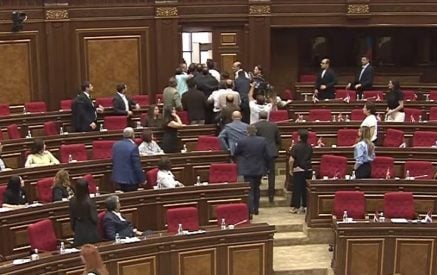In the last editorial, I mentioned that debates in the National Assembly are surrounding the “thieves” and “land-givers” labels, and that primitive debate seems dangerous to me from the state’s point of view. The readers responded in three ways: 1) “Thief” is right, “land-giver” is wrong, 2) “Land-giver” is right, “thief” is wrong, 3) Both are right, and the three (two, in reality) forces in parliament must be taken out of the arena and new forces must come into the political sphere.
Do I agree with those three claims? Yes and no. The “thief” and “land-giver” descriptions, which are used against the former and current authorities and the forces represented in the parliament now, are not wrong, but it is all an element of a “puzzle” (mosaic), which, when viewed separately, we are far from understanding the whole picture. If the goal is to insult, “destroy,” and “crush” someone, then there is no problem- you can be limited to those labels. But if there is an effort to find the most favorable and realistic way for the development of our state, then these labels are not enough.
And not only that. Take, for example, another dramatic event in the lives of many of us: the collapse of the Soviet Union. Those who live in nostalgia for the “old days” say, “Gorbachev destroyed the wonderful, prosperous country with his wrong policies.” (Some of them talk about the conspiracy of this or that “dark force,” but we are not discussing extremist, prejudiced theories). Those with more liberal, pro-Western views say the country was no longer viable and died, so to speak, of “its own death.” These two statements are not wrong, but by and large they do not explain anything. Both the actions of one person and the “normal course of history” are subject to larger patterns, which, of course, can not be detected on a single computer page. Anyway, let me express my modest opinion. The Soviet Union could have transformed to become a more or less democratic and free market country if it did not consist of national republics whose elite (including the communist one) had no ambitions to seize all power and take over all the wealth of the republics.
Going back to our problem, let’s accept that the political forces and their supporters, naturally, must say that we are leading the country to a bright future, or, if we come to power, we will lead the country to that future. But I am more interested in how the mechanisms of society and the state work and why those mechanisms are now broken.
Read also
Let me bring another parallel at the end. Imagine a kiosk for car parts. Its owner should praise their product, say “welcome here,” insist that his spare parts are good, “they are from good brands,” and the buyer will not have any problems. They must also say that the owner of the kiosk across the street is a charlatan and a liar. But there are also car diagnostic centers, and if the car fails to start, they determine the cause of the malfunction. Both types of work are required. But the second one is interesting to me.
Aram Abrahamyan























































